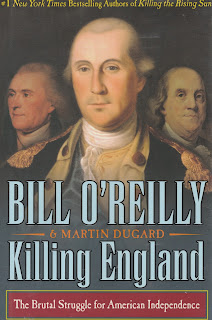I wonder if the outcome would have been different if King George III had been sane and not so
incapacitated during his reign (he was often put in a straightjacket) and the British Parliament had been more stable. Perhaps then the American colonies could have been handled more diplomatically.
Instead, revenue
was raised by taxing paper and documents (Stamp Act 1765). Tariffs were introduced and the Tea Act of 1773
enforced. The colonists resented that they had no representation in parliament.
Unrest led to a series of attacks (the Boston Massacre) and the colonists
retaliated by dumping chests of tea into Boston Harbor which again led to more restricting acts by Parliament.
Bill O'Reilly's "The Killing Series" gives an in depth look into many historical moments and Killing England is another book packed with historical data and a view of both the American Revolution and the major participants.
The final battle was the Siege of Yorktown when American rebels, the Continental army, African American soldiers from the First Rhode Island Regiment and the French army (led by General Washington, Lieutenant Colonel Hamilton, and the Marquis de Lafayette) fought the British force of 9,000 British, loyalist and Hessian (German) soldiers led by Lord Cornwallis.
Some interesting facts:
The battles didn't only take place on American soil, but John Paul Jones spent the summer of 1779 attacking and capturing ships around the British coast.
Lieutenant is a term meaning in lieu of (replacement if his senior officer became incapacitated)
After New York is recaptured, George Washington and General Jean-Baptise Rochambeau sign the British surrender documents. 8,000 British are taken as prisoners of war. On Evacuation Day (November 25, 1783) wealthy British loyalists leave for England, others are taken to Nova Scotia or the West Indies. Over 25,000 soldiers and loyalists leave New York.
February 27, 1782 the British Parliament issued a second resolution confirming the British offensive war in America is over.
British loyalists were treated badly from both sides of those fighting the war. The British considered all Americans as traitors and Banastre Tarleton killed both those opposing the British and many loyalists and their homes. Rather than taking prisoners, he slaughtered those he came across.


